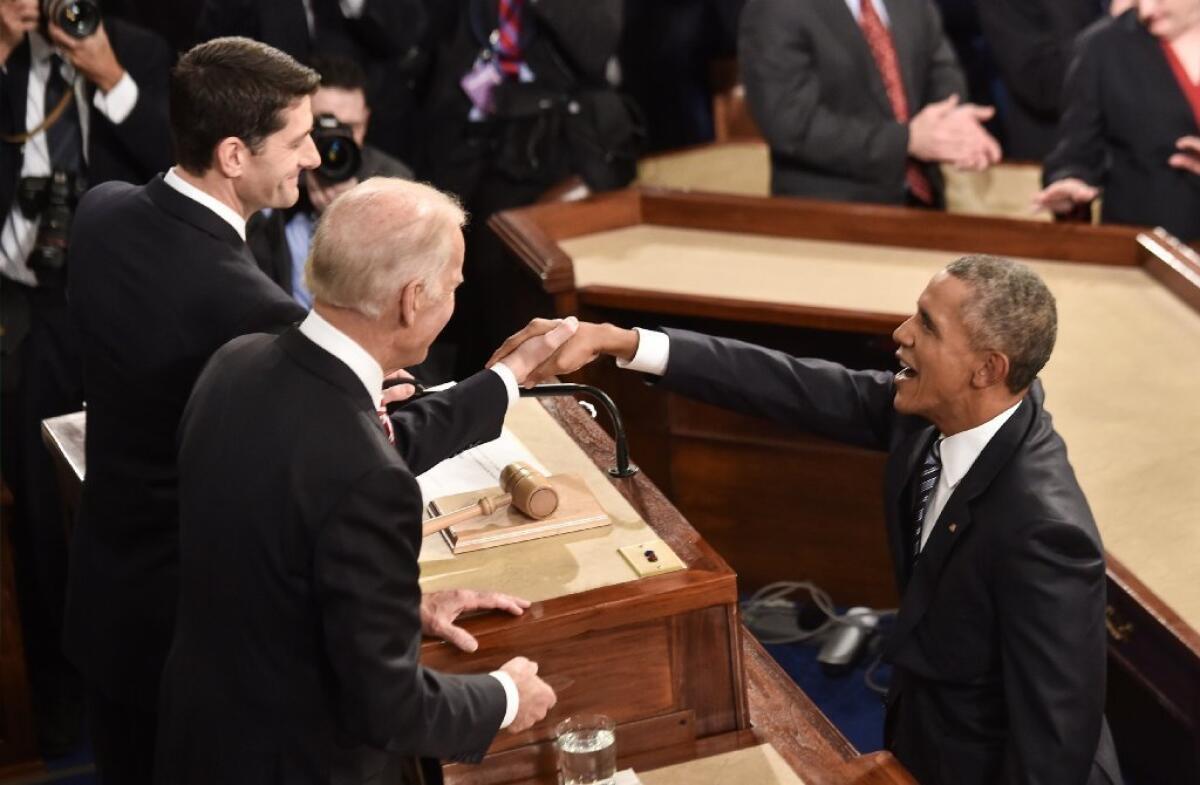How Obama took on Trump during his State of the Union address

President Obama greets House Speaker Paul D. Ryan (R-Wis.) before his final State of the Union address Tuesday.
- Share via
Reporting from Washington — Last April, with the race for president still far away, President Obama used his speech at the annual White House Correspondents Dinner to poke fun at some likely Republican contenders, needling Jeb Bush’s efforts to court Latinos and Ted Cruz’s denial of climate change.
“And,” he added caustically, “Donald Trump is here. Still.”
Jumbo screens showed the billionaire businessman waving affably from a back table. But the idea of a Trump candidacy was the punch line, and the Washington media and political elites packed in the ballroom laughed in appreciation.
Obama is no longer laughing. His final State of the Union address Tuesday night amounted to a vigorous – and frequently barbed – defense of his record and his legacy in the face of Trump’s unexpected rise to the top of the Republican nomination race.
Obama never mentioned Trump by name. Nor did South Carolina Gov. Nikki Haley, who was chosen by Republican Party leaders to respond to the president.
But with her state primary a key early battleground in the presidential race, Haley used her platform to warn Americans against following the “siren call of the angriest voices.”
Trump initially fired back only on Twitter. “The State Of The Union speech was one of the most boring, rambling and non-substantive I have heard in a long time,” he tweeted Wednesday.
Later, however, he spoke by phone to Fox and Friends to respond to Obama’s declaration that politicians who insult Muslims are “just wrong” and diminish America in the eyes of the world.
Trump repeatedly said Obama is “living in fantasy land.” Whether the president likes him or not is “not very important,” he said.
He also slammed Haley as “very weak on illegal immigration,” and said she had asked him “for a hell of a lot of money” for her political campaigns in the past.
More importantly, Trump complained that Obama didn’t use the words “radical Islamic terrorism” in his speech. “He doesn’t want to use those terms. He doesn’t want to talk about it.”
Actually, Obama devoted part of his speech to the battle against Islamic State.
In comments clearly aimed at Trump and his allies, he warned against “over-the-top claims that this is World War III,” saying the extremist group does not “threaten our national existence.”
Obama also warned against those who would “push away vital allies in this fight by echoing the lie that ISIL is representative of one of the world’s largest religions,” using an acronym for Islamic State.
Trump also said that Obama “doesn’t want to talk about California, what happened there with the 14 people killed -- viciously killed by the two radicalized people,” referring to the Dec. 2 shooting in San Bernardino. “He doesn’t want to talk about what’s going on in the world, the real facts.”
Four days after the attack, Obama gave an address to the nation from the White House that focused specifically on the San Bernardino attack, the broader threat of terrorism, and the government’s efforts to keep the country safe.
The White House initially viewed the rise of Trump as a symptom of a rightward lurch in the Republican Party rather than a reflection of the national mood. They now view him more warily as a threat to Obama’s achievements over the past seven years.
Trump’s consistent lead in GOP polls and the seeming public appetite for his invective led the president to use his State of the Union speech to fight back, aides said.
Memoli reported from Washington and Finnegan from Los Angeles.
More to Read
Sign up for Essential California
The most important California stories and recommendations in your inbox every morning.
You may occasionally receive promotional content from the Los Angeles Times.















